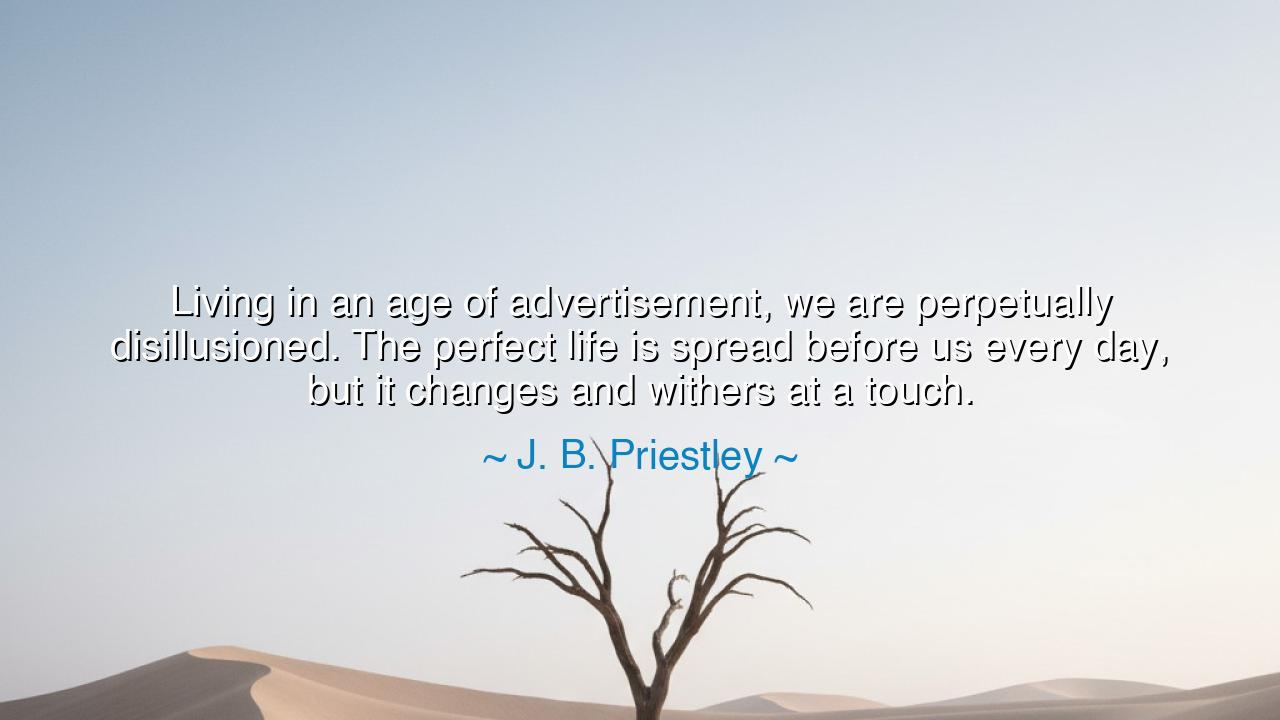
Living in an age of advertisement, we are perpetually
Living in an age of advertisement, we are perpetually disillusioned. The perfect life is spread before us every day, but it changes and withers at a touch.






In the world where the mind is bombarded daily with images, promises, and ideals, there is a haunting truth that has persisted through the ages: the perfect life, so often promised by the world, is a fickle illusion. J.B. Priestley, with poignant clarity, states, "Living in an age of advertisement, we are perpetually disillusioned. The perfect life is spread before us every day, but it changes and withers at a touch." These words are not just a commentary on the world of advertising but on the fragility of the ideals we are fed daily. The perfect image we are presented with—whether it is beauty, success, or happiness—is fleeting and often deceptive, with the truth of human experience lying far beyond the shiny images that flicker before our eyes.
The ancients, too, understood the dangerous allure of illusion. The Greeks, in their timeless wisdom, often spoke of the deceptive nature of appearances and the need to seek deeper truths. Plato, in his allegory of the cave, describes prisoners who are bound and see only the shadows cast on the wall before them. To them, these shadows are the only reality they know. But when one prisoner escapes and steps into the light of day, he realizes the truth—the shadows were mere illusions, a distorted version of the real world. In much the same way, advertisements today offer us shadows of the perfect life, carefully curated images designed to keep us confined in a world of illusion, where the deeper truth of living remains hidden.
In the ancient Roman world, the concept of vanity was celebrated and cautioned against in equal measure. The pursuit of honor and reputation, often based on external appearances, was a driving force for many Romans, from politicians to generals. Yet the philosophers, particularly the Stoics, taught that true virtue lies not in external accolades or fleeting beauty, but in the inner life—in cultivating wisdom, courage, and temperance. Seneca, one of the most prominent Stoic philosophers, warned against the temptation to be swayed by external appearances and fleeting pleasures. He urged his followers to seek inner contentment, recognizing that the world would always present illusions of success and happiness, but only the pursuit of virtue would bring true peace.
Priestley’s words remind us of this ancient wisdom—advertising, with its promises of the perfect life, offers only shadows. It seeks to distract us from the deeper realities of existence, filling our minds with desires that are often empty or unattainable. The perfect life, as portrayed in glossy magazines, on billboards, or in online ads, is a mirage, constantly shifting and withering at a touch. It is a delusion that promises fulfillment, yet delivers emptiness, leaving us perpetually yearning for more, never fully satisfied. This cycle of desire and disillusionment can trap us, just as the prisoners in Plato's cave were trapped by the shadows on the wall, unable to see the fuller truth of their existence.
Consider the life of King Midas from Greek mythology, whose wish for everything he touched to turn to gold seemed like the ultimate dream of wealth and success. Yet, in his greed and pursuit of a perfect, material existence, he soon realized the true cost of his wish. His food, his loved ones, even his own body were turned to gold, leaving him with nothing of true value. His story is a timeless reminder that the pursuit of illusory ideals, represented by the golden touch, can lead to disaster. The perfect life, when sought without understanding, can strip away the deeper, more meaningful aspects of living—the relationships, the joy, and the human connections that truly sustain us.
The lesson Priestley offers us is a call to awaken from the spell of illusion that advertisements and societal expectations cast upon us. We must recognize that the perfect life, as it is often presented to us, is fleeting and unrealistic. It is a construction designed to keep us dissatisfied, always chasing an ideal that changes with each passing moment. Instead, we must look beyond the surface and seek the real life—one built on meaningful experiences, genuine relationships, and a pursuit of inner peace. In the words of Socrates, "The unexamined life is not worth living." It is only when we begin to look beyond the advertisements and the shiny illusions that we can uncover the richness of the life that is ours to live.
Practical action calls upon us to resist the pull of superficial ideals and to instead seek the deeper truths of existence. Let us examine our lives, asking ourselves what truly brings meaning and satisfaction. Rather than chasing after fleeting promises of perfection, we must find contentment in the simple, the real, and the authentic. Take time to connect with those around you, to experience life not through the lens of advertisements or social media, but through genuine, lived experiences. In doing so, we free ourselves from the cycle of disillusionment and step into a life that is not dictated by external illusions, but shaped by purpose, wisdom, and the joy of living truly.






AAdministratorAdministrator
Welcome, honored guests. Please leave a comment, we will respond soon